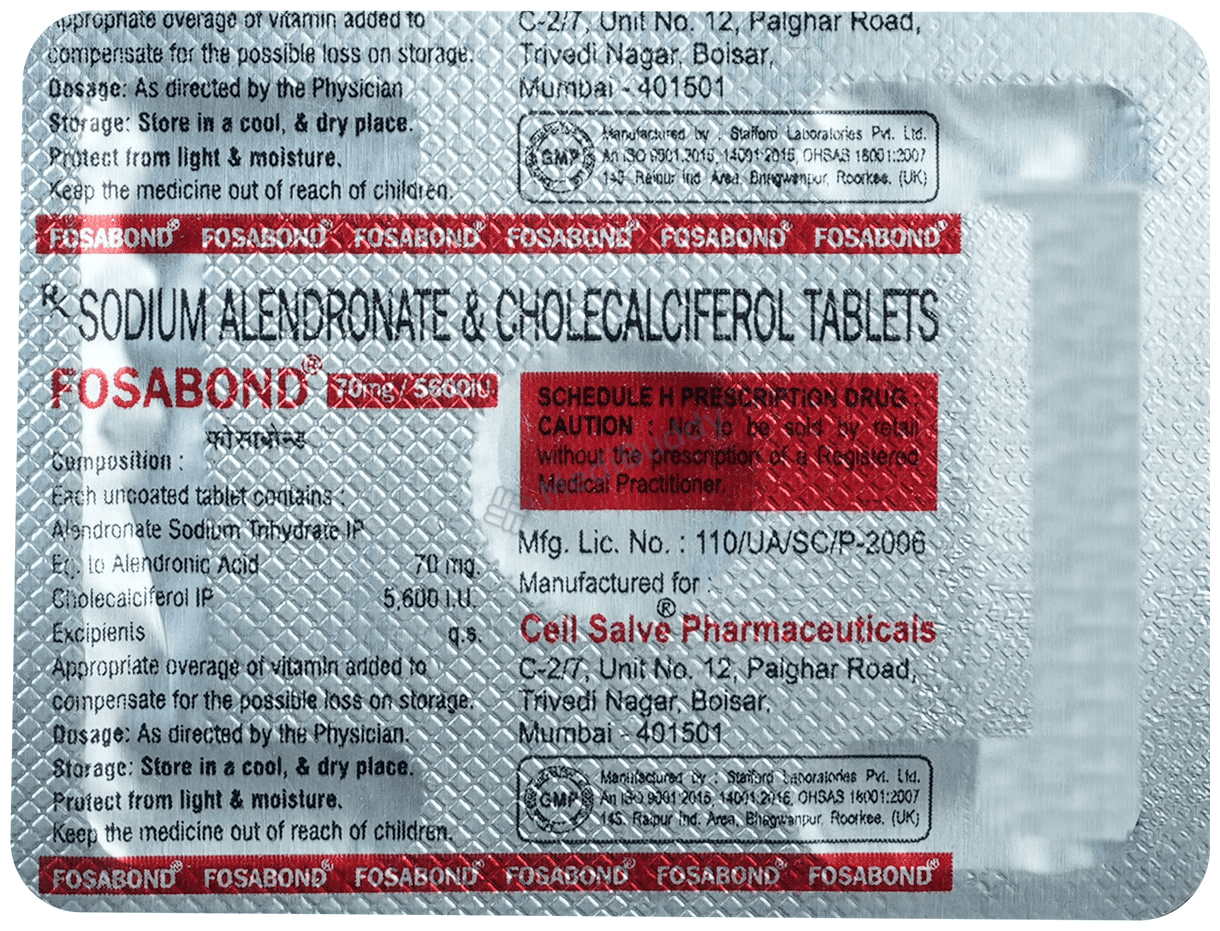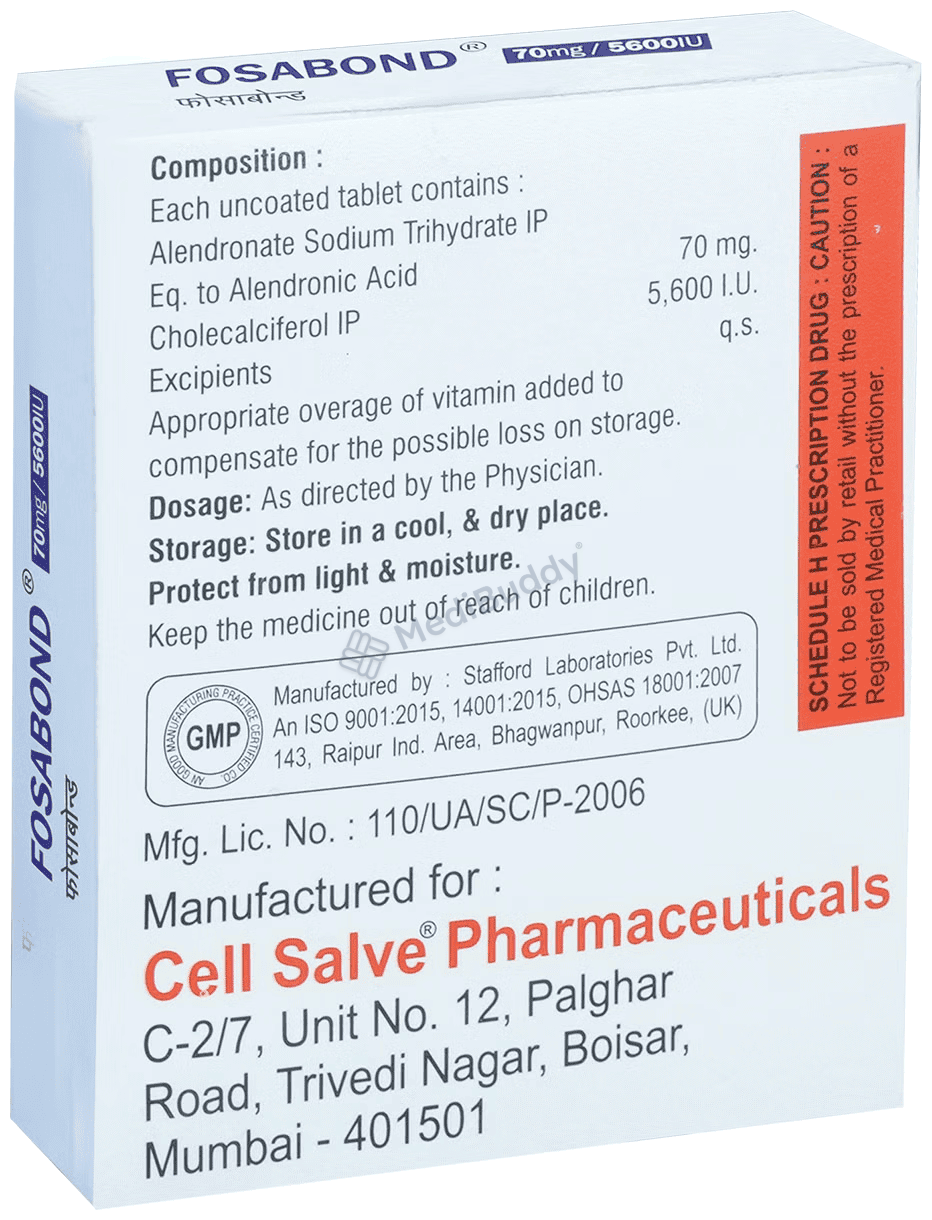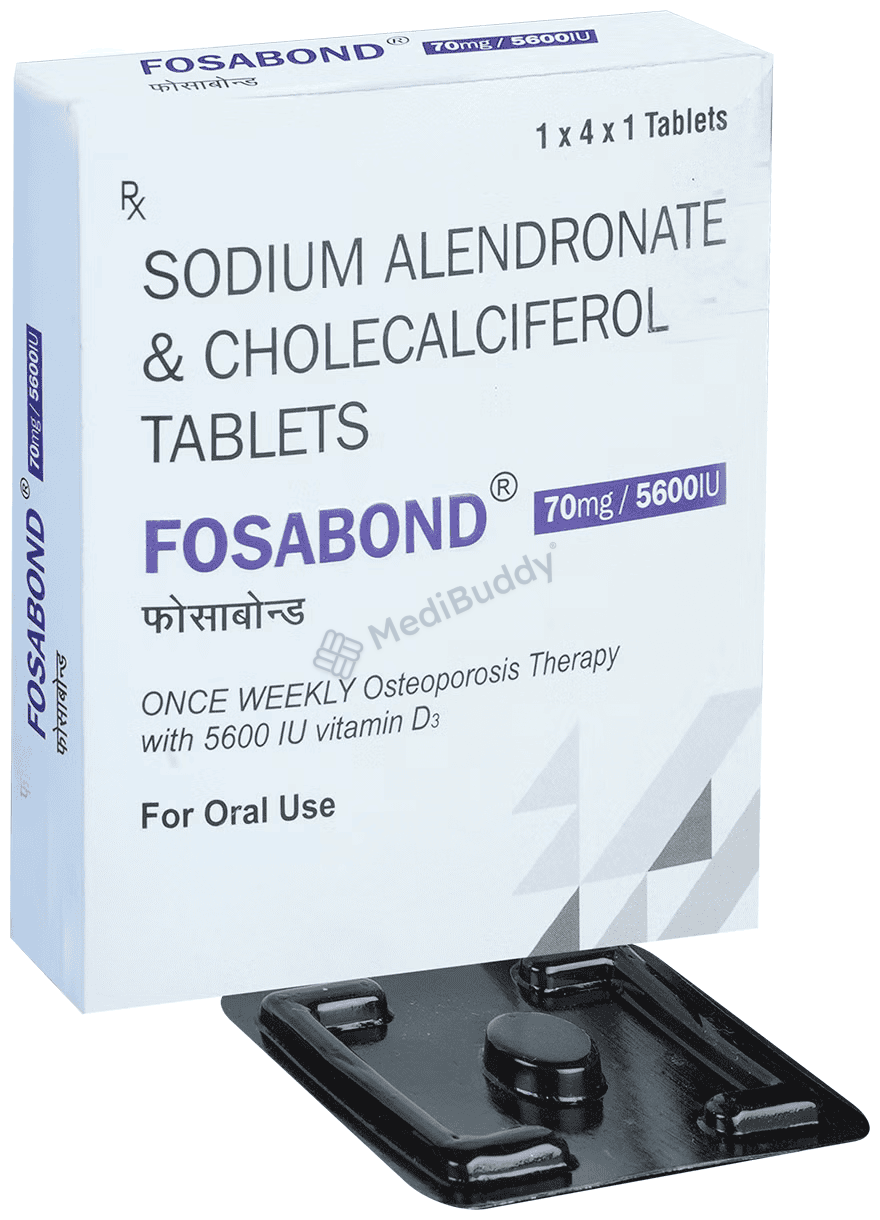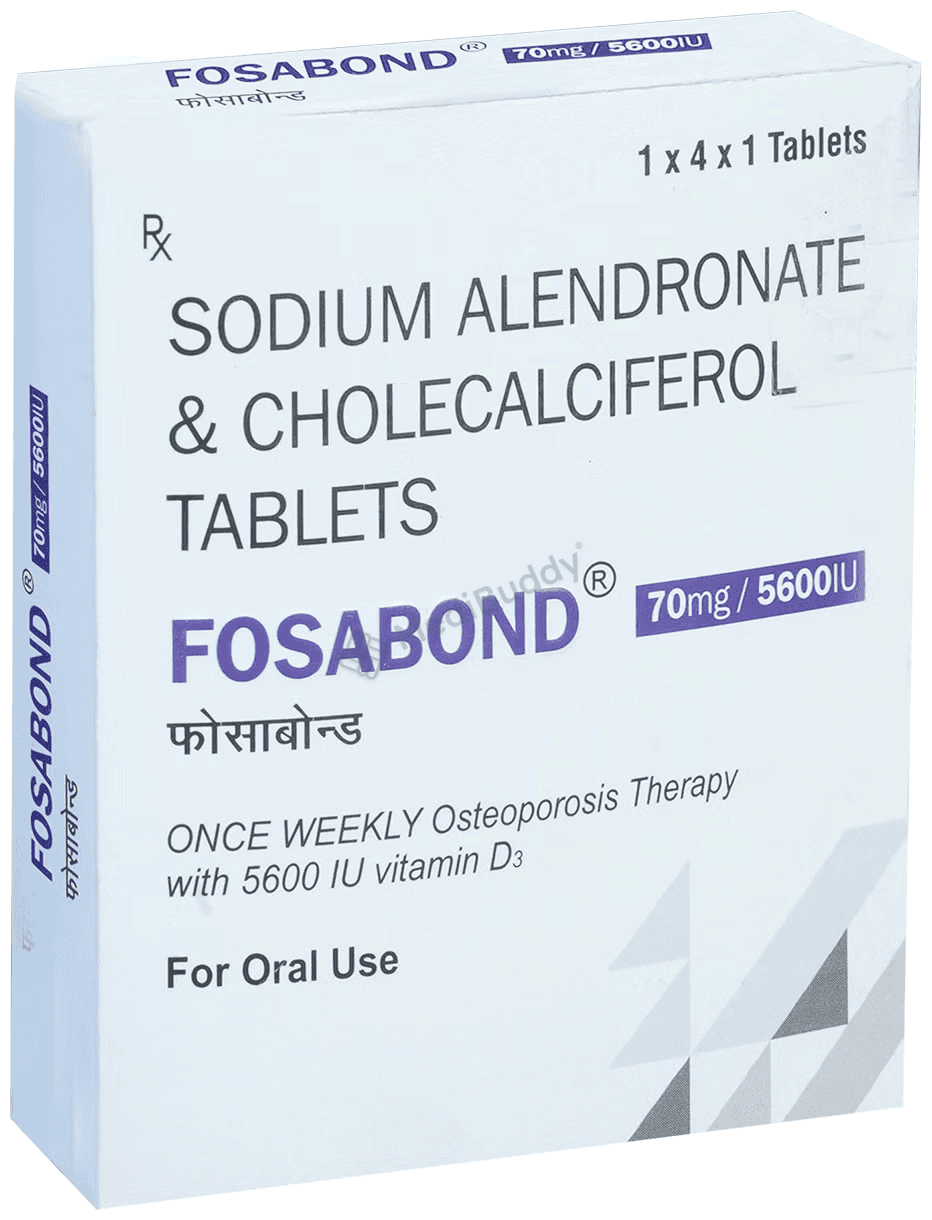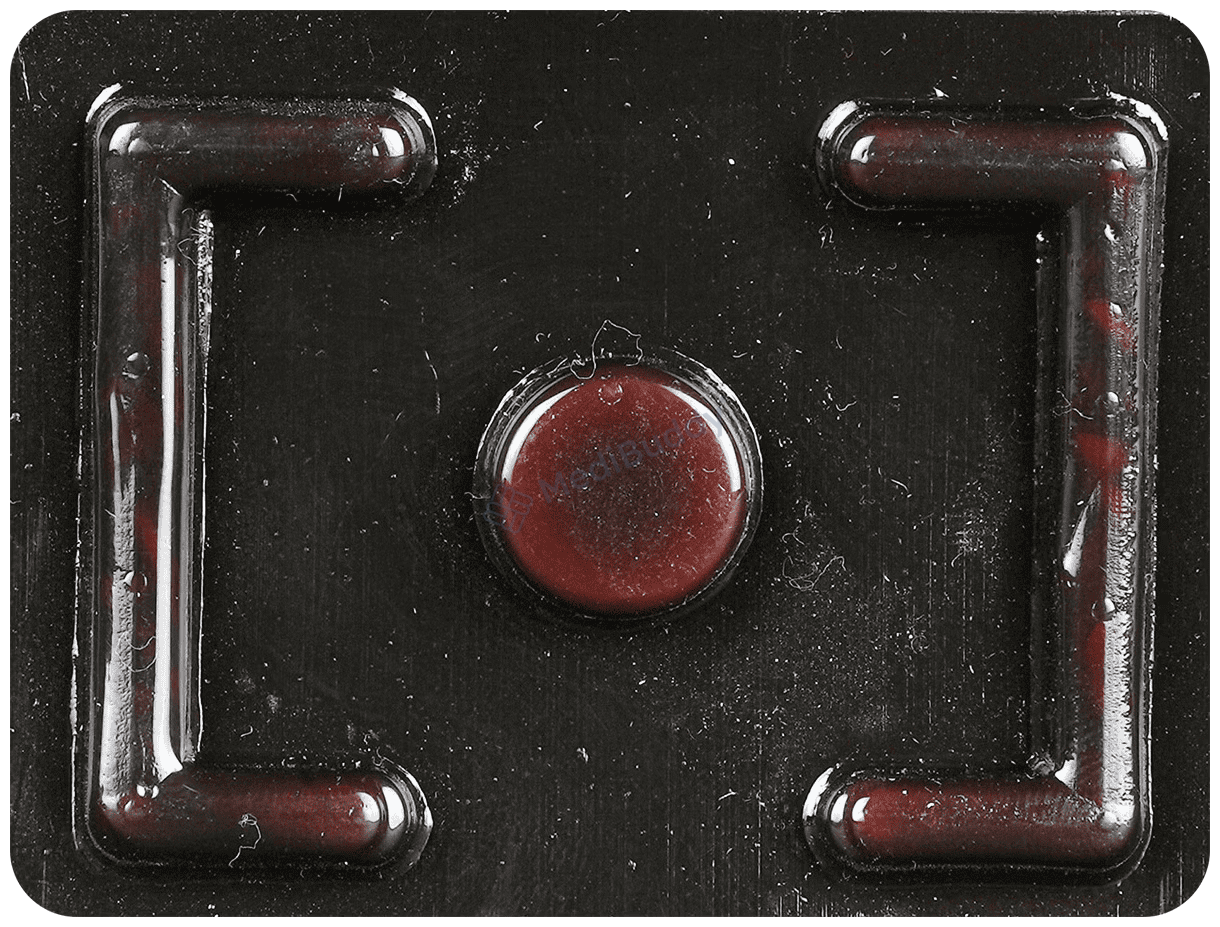Fosabond Tablet
By Fosabond
Rx
4 Tablet in a Strip

Composition
Alendronic Acid(70mg) + Vitamin D3(5600IU)

Manufacturer - Cell Salve Pharmaceuticals
shop no. 14,sher singh bazaar road, kotla mubarakpur, south extension, new delhi, delhi, 110003, india

Expires on or after
September, 2026
About Fosabond Tablet
Fosabond Tablet is a medication specifically prescribed to address osteoporosis, a condition characterized by weak and brittle bones. This tablet works by preventing bone loss, promoting bone thickness, and enhancing muscle strength to support overall body function. Typically recommended for women post-menopause, Fosabond Tablet aids in rebuilding bones and reducing the risk of fractures in the hip and spine.
The key components of Fosabond Tablet are Alendronic acid (Alendronate) and Cholecalciferol (Vitamin D3), which play a crucial role in regulating bone turnover and preventing bone cell damage. It is essential to take Fosabond Tablet consistently on an empty stomach at the same time daily for best results. This routine helps ensure optimal absorption and effectiveness of the medication, although it may take some time for the full benefits to be realized.
Although generally well-tolerated, Fosabond Tablet may lead to some mild side effects such as headache, back pain, musculoskeletal discomfort, indigestion, heartburn, and diarrhea. These side effects often diminish on their own, but any persistent or worsening symptoms should be reported to a healthcare provider promptly. It is advisable to share with your doctor any existing medical conditions, allergies, or medications you are currently taking to ensure the safety and efficacy of Fosabond Tablet for your specific situation.
As part of an overall treatment program addressing osteoporosis, Fosabond Tablet may be supplemented with dietary changes, additional medications, and vitamin supplements. Regular monitoring through medical tests may also be necessary to assess kidney function and mineral levels during the course of treatment. Notably, pregnant or breastfeeding women should consult their healthcare providers before using this medication, and it is generally recommended to limit alcohol intake while on Fosabond Tablet to prevent further bone loss.
Benefits
Fosabond Tablet is a valuable medication for treating osteoporosis in postmenopausal women. This common condition weakens bones, making them fragile and prone to fractures that can be painful and limit daily activities. By containing Alendronic acid (Alendronate) and Cholecalciferol (Vitamin D3), Fosabond Tablet plays a crucial role in reducing the risk of fractures associated with osteoporosis. This medication works by preventing bone destruction and resorption, helping to maintain the normal density of bones and slowing down the activity of bonedestroying cells. Cholecalciferol, the active form of Vitamin D in Fosabond Tablet, plays a vital role in promoting bone integrity and health.
Regular use of Fosabond Tablet aids in the growth and development of bones while maintaining their strength. While osteoporosis may not present immediate symptoms, continued treatment with Fosabond Tablet is essential for longterm bone health. It is recommended to follow your doctor's instructions diligently and continue taking the medication until advised otherwise. In addition to medication, it is important to maintain a balanced diet rich in calcium and vitamin D for optimal bone health. Including dairy products, green leafy vegetables, and other calciumrich foods in your diet can complement the benefits of Fosabond Tablet in strengthening and restoring the integrity of weak bones.
How to use the Fosabond Tablet
To use Fosabond Tablet properly, always follow your doctor's instructions on the dosage and duration of the medicine. It is important to swallow the tablet whole and not chew, crush, or break it. The best way to take Fosabond Tablet is on an empty stomach for better absorption. You can take one Fosabond Tablet preferably 30 minutes before eating, or as directed by your doctor. Remember to swallow the tablet with water for easier ingestion. By following these simple steps, you can ensure that you are using Fosabond Tablet correctly and maximizing its effectiveness.
Uses of Fosabond Tablet
The Fosabond Tablet is commonly used to treat osteoporosis, a condition that weakens bones and makes them more likely to break. This medication helps to strengthen bones and reduce the risk of fractures in individuals with osteoporosis. By taking Fosabond Tablet as prescribed by a healthcare provider, patients can improve bone density and overall bone health. It is an effective treatment option to manage osteoporosis and prevent complications associated with this condition.
What conditions Fosabond Tablet treats?
Fosabond Tablet is used to treat osteoporosis, a condition where bones become weak and prone to fractures. This is often due to disease or aging, like menopausal osteoporosis. In osteoporosis, bonedestroying cells are more active than boneforming cells. Symptoms are usually not apparent until a fracture occurs and bones start to break.
Should you consult a doctor?
If you experience persistent or worsening side effects of Fosabond Tablet, it is important to seek medical attention. Common side effects such as headache, back pain, musculoskeletal pain, indigestion, heartburn, and diarrhea should be monitored. If these side effects do not go away or become more severe, it is advisable to inform your doctor. Additionally, if you have any concerns or worries about the side effects, consulting your healthcare provider is recommended. It is essential to communicate any existing medical conditions or disorders to your doctor before starting this medication. Pregnant and breastfeeding women should also consult their healthcare provider before using Fosabond Tablet. Regular medical checkups may be necessary to monitor kidney function and mineral levels during treatment. Avoid excessive alcohol consumption as it can contribute to bone loss. By seeking prompt medical advice when needed, you can ensure the safe and effective use of Fosabond Tablet in managing osteoporosis.
Side effects of Fosabond Tablet
When taking Fosabond Tablets, you may experience various side effects. These side effects are usually mild and temporary, and they often go away as your body gets used to the medication. However, if they persist or if you are concerned about them, it is important to consult your doctor. Some common side effects of Fosabond Tablet include headaches, musculoskeletal pain (pain in bones, muscles, or joints), back pain, indigestion, diarrhea, and heartburn. Other less common side effects that may occur but require medical attention include constipation, gas, dizziness, lethargy, and hair loss. If you notice any of these side effects and are worried, it is advisable to seek guidance from a healthcare professional.
Safety advice

liver
Fosabond Tablet is considered safe for patients with liver disease based on available data. It appears that dose adjustment may not be necessary for these patients. However, it is still important to consult with your doctor before using Fosabond Tablet to ensure the best and safest treatment plan for your specific condition.

kidney
Limited data suggests Fosabond Tablet is likely safe for kidney disease patients, and may not require dose adjustment. Consult your doctor for guidance.

alcohol
Caution advised when taking Fosabond Tablet with alcohol. Consult your doctor.

driving
Fosabond Tablet may cause side effects like dizziness, muscle, joint, bone pain, and eye issues that could impact driving ability. Be cautious as these effects are rare but possible.

pregnancy
Fosabond Tablet may not be safe to use during pregnancy. Animal studies indicate potential harm to the developing baby. Consult your doctor as they will evaluate the benefits and risks before prescribing.

breastfeeding
Fosabond Tablet is considered safe for breastfeeding. Limited data indicates no significant risks to the baby. If breastfeeding while taking Fosabond, monitor the baby's blood calcium levels in the first two months.
Consumption warning before consuming Fosabond Tablet
Before taking Fosabond Tablet, make sure to inform your doctor about any allergies you may have to its components. It is crucial to disclose any oesophageal disorders, jaw issues, peptic ulcer disease, kidney problems, low blood calcium or Vitamin D levels, or a history of immobilization preventing you from sitting upright. Additionally, inform your doctor if you have any form of cancer and are undergoing chemotherapy or radiotherapy. Provide a comprehensive medical history, detailing the use of steroids, antacids, specific antibiotics, calcium supplements, magnesium containing laxatives, aspirin, or pain relievers. Smoking habits should be reported to the doctor, as well as recent surgeries or upcoming surgical or dental procedures. It is essential to keep your healthcare provider informed about any such conditions to ensure safe and effective use of Fosabond Tablet.
Disease interactions
When considering the use of Fosabond Tablet, it is important to be cautious in patients with certain medical conditions. These include hypersensitivity disorders, hypocalcemia, hypoparathyroidism, rickets, osteomalacia, kidney disease, cancer, peptic ulcer disease, malabsorption syndrome, Barrett’s esophagus, and any conditions causing jaw pain. Patients with these conditions should use Fosabond Tablet carefully, as the interactions with these diseases may affect the efficacy or safety of the medication.
What if you forgot to take Fosabond Tablet?
If you forget to take a dose of Fosabond Tablet, try to take it as soon as you remember. But if it's close to the time for your next scheduled dose, just skip the missed one and continue with your regular dosing schedule. It's important not to take a double dose to make up for the missed one, as this can increase the risk of side effects and complications. Remember to always follow the instructions provided by your healthcare provider for the best results.
Related lab tests
Related Lab Tests for Fosabond Tablet may include:
1. Serum Calcium Level Test: This lab test measures the levels of calcium in the bloodstream. It helps in monitoring the effects of Fosabond Tablet on calcium levels in the body.
2. Bone Mineral Density Test: This test evaluates the density of minerals in bones and helps in assessing bone health. It is important to monitor bone density while using Fosabond Tablet to track any changes.
3. Serum Phosphate Level Test: Phosphate levels in the blood can be influenced by medications like Fosabond Tablet. Monitoring phosphate levels is essential to ensure proper bone health and overall wellbeing.
4. Alkaline Phosphatase Test: Alkaline phosphatase is an enzyme that plays a role in bone formation. This test can help in evaluating bone health and monitoring the effects of Fosabond Tablet.
5. Vitamin D Level Test: Vitamin D is essential for maintaining healthy bones and calcium levels. Testing vitamin D levels can be important when using Fosabond Tablet to ensure optimal bone health.
These lab tests can provide valuable information about how Fosabond Tablet is affecting calcium metabolism, bone health, and overall wellbeing. Regular monitoring of these tests can help in managing the medication effectively and preventing any potential complications.
Additional Information
| Habit Forming | No |
| Chemical Class | - |
| Therapeutic Class | PAIN ANALGESICS |
| Action Class | - |
FAQs
Disclaimer
The information provided on this website is to the best of our abilities to ensure it is accurate, reliable, and reviewed by a team of professionals. It should not be used to diagnose, prevent, or cure any health problem. The information presented here is not intended to create a doctor-patient relationship or replace a registered medical practitioner's advice, diagnosis, or treatment. The absence or provision of any information or warning regarding any medicine should not be assumed as an implied or explicit assurance of safety or efficacy. We highly recommend consulting your registered medical practitioner for all queries or doubts related to your medical condition. Do not ignore professional medical advice or delay seeking it based on the content encountered on our website. We intend to support, not replace, the doctor-patient relationship.
₹496.8
₹552
10% OFF
Inclusive of all taxes
Content verified by

Dr. Preeti Kumar
MBBS, DGO - Obstetrics and Gynaecology, DNB - Obstetrics and Gynaecology
Last update on 01-Oct-2024
